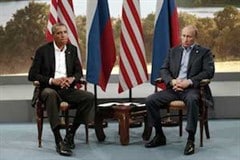Understandable outrage at the terrible fate of the 298 innocent passengers on flight MH17 has led Western leaders to reach for their favourite way of coercing rogue states into better behaviour. Sanctions have been ramped up on Russia, targeting key personnel around President Vladimir Putin and cutting specific sectors of the Russian economy off from fruitful business with US and EU partners.
Russia now joins countries ranging from Belarus to Zimbabwe on the US Treasury’s list of states, groups and individuals that fall into the 27 broad headings for its sanctions. The EU’s members have almost as extensive an itinerary of blacklists.
It is 95 years since Woodrow Wilson offered the world sanctions as an alternative to war. Then the US president insisted: “A nation boycotted is a nation in sight of surrender.” In 1919, it seemed a plausible and desirable alternative to using force or time-consuming diplomacy. But it has proved much easier to impose sanctions than for them to bring success. They take time to bite – and don’t usually wound the targets intended.
If sanctions worked, even if slowly, then the Kim dynasty would not have survived as hereditary rulers of North Korea since Western sanctions began in 1950. The Castro brothers in Cuba have weathered 52 years of US sanctions. The Assads are comparative latecomers to the blacklist – but have ruled Syria under US sanctions since 1986. Saddam Hussein was not toppled by 13 years of comprehensive sanctions after 1990.
Worse still, far from being an alternative to war, sometimes sanctions have provoked a state into lashing out rather than pulling in its claws, as happened with Japan in 1941 in response to an Anglo-American oil embargo. Given that the Prime Minister and Hillary Clinton, a potential US president, have explicitly compared Putin’s Russia to Nazi Germany, it is difficult to see how economic sanctions are expected to modify his behaviour. But war to restrain a nuclear-armed state is not an option. So should negotiation with Russia, as the alternative, be dismissed as appeasement from the start?

